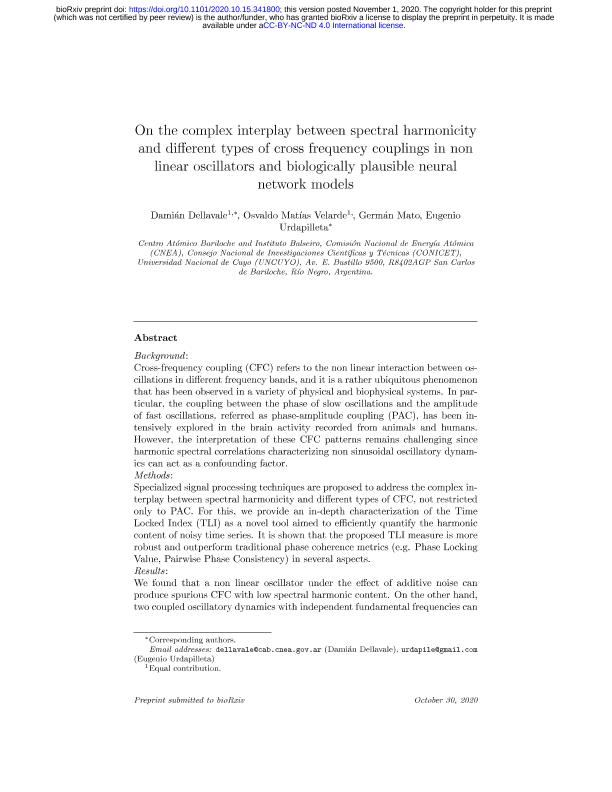Artículo
Complex interplay between spectral harmonicity and different types of cross-frequency couplings in nonlinear oscillators and biologically plausible neural network models
Fecha de publicación:
12/2020
Editorial:
American Physical Society
Revista:
Physical Review E
ISSN:
2470-0045
e-ISSN:
2470-0053
Idioma:
Inglés
Tipo de recurso:
Artículo publicado
Clasificación temática:
Resumen
Cross-frequency coupling (CFC) refers to the nonlinear interaction between oscillations in different frequency bands, and it is a rather ubiquitous phenomenon that has been observed in a variety of physical and biophysical systems. In particular, the coupling between the phase of slow oscillations and the amplitude of fast oscillations, referred as phase-Amplitude coupling (PAC), has been intensively explored in the brain activity recorded from animals and humans. However, the interpretation of these CFC patterns remains challenging since harmonic spectral correlations characterizing nonsinusoidal oscillatory dynamics can act as a confounding factor. Specialized signal processing techniques are proposed to address the complex interplay between spectral harmonicity and different types of CFC, not restricted only to PAC. For this, we provide an in-depth characterization of the time locked index (TLI) as a tool aimed to efficiently quantify the harmonic content of noisy time series. It is shown that the proposed TLI measure is more robust and outperforms traditional phase coherence metrics (e.g., phase locking value, pairwise phase consistency) in several aspects. We found that a nonlinear oscillator under the effect of additive noise can produce spurious CFC with low spectral harmonic content. On the other hand, two coupled oscillatory dynamics with independent fundamental frequencies can produce true CFC with high spectral harmonic content via a rectification mechanism or other post-interaction nonlinear processing mechanisms. These results reveal a complex interplay between CFC and harmonicity emerging in the dynamics of biologically plausible neural network models and more generic nonlinear and parametric oscillators. We show that, contrary to what is usually assumed in the literature, the high harmonic content observed in nonsinusoidal oscillatory dynamics is neither a sufficient nor necessary condition to interpret the associated CFC patterns as epiphenomenal. There is mounting evidence suggesting that the combination of multimodal recordings, specialized signal processing techniques, and theoretical modeling is becoming a required step to completely understand CFC patterns observed in oscillatory rich dynamics of physical and biophysical systems.
Palabras clave:
cross frequency coupling
,
coupled oscillators
,
neuronal networks
Archivos asociados
Licencia
Identificadores
Colecciones
Articulos(CCT - PATAGONIA NORTE)
Articulos de CTRO.CIENTIFICO TECNOL.CONICET - PATAGONIA NORTE
Articulos de CTRO.CIENTIFICO TECNOL.CONICET - PATAGONIA NORTE
Citación
Dellavale Clara, Hector Damian; Velarde, Osvaldo Matias; Mato, German; Urdapilleta, Eugenio; Complex interplay between spectral harmonicity and different types of cross-frequency couplings in nonlinear oscillators and biologically plausible neural network models; American Physical Society; Physical Review E; 102; 6; 12-2020; 1-77
Compartir
Altmétricas




